Value-Sensitive Therapy with Bill Doherty
$49.00 Original price was: $49.00.$7.70Current price is: $7.70.
Value-sensitive therapy: A transformative approach by Bill Doherty – Digital Download!

Value-Sensitive Therapy with Bill Doherty
Overview

Value-Sensitive Therapy: A New Path Forward by Bill Doherty
As society wrestles with competing values and complex ethical choices, the field of therapy is also undergoing transformation. Leading this shift is value-sensitive therapy, created by Dr. William J. Doherty. This groundbreaking method stresses the importance of weaving moral and ethical discussions into the heart of therapy. Instead of subscribing to the traditional belief in therapist neutrality — the idea that practitioners should remain detached and unbiased — Dr. Doherty suggests that therapists inevitably influence the therapeutic space with their personal values. This recognition positions ethical challenges as central themes in therapy, encouraging clients to explore both their personal issues and the broader societal effects of their decisions.
This article will explore the foundational ideas of value-sensitive therapy, offering a look at its practical use, the hurdles it encounters, and its wider impact on family life and society. By examining real-world case examples, critiques of rampant individualism, and the call for stronger social responsibility, we aim to show how this approach can deepen therapeutic work and client engagement.
Core Concepts Behind Value-Sensitive Therapy
At the heart of value-sensitive therapy is an acknowledgment of the moral terrain inherently present in therapeutic encounters. Below are the key tenets that define this approach:
-
Engagement with Ethical Dimensions
Moral involvement: Therapists do more than facilitate conversations — they actively shape clients’ moral growth. Value-sensitive therapy brings ethical tensions to the forefront, treating them as crucial components of therapeutic work.
Dialogue about values: By encouraging open discussions about moral duties, therapists can guide clients toward more meaningful reflections and ethical decision-making. -
Focusing on Relational Dynamics
Considering broader impacts: Dr. Doherty emphasizes helping clients think beyond themselves, exploring how their decisions affect loved ones and their communities.
Building community ties: Value-sensitive therapy views personal problems within a broader web of relationships, enriching the understanding of social dynamics and interpersonal effects. -
Challenging the Culture of Individualism
Critiquing self-centeredness: In a culture that prizes individual success, the importance of commitments to family and community can be lost. Value-sensitive therapy pushes back, advocating fulfillment through maintaining strong relational ties.
Highlighting collective responsibility: Therapists encourage clients to see their choices as part of a larger social context, promoting decisions that contribute positively to both personal and communal well-being.
These principles form an integrated framework that questions traditional therapeutic neutrality and invites a more ethically engaged form of therapy.
Real-World Application of Value-Sensitive Therapy
Value-sensitive therapy isn’t just a theoretical concept; it offers concrete strategies therapists can use to engage with clients on ethical grounds.
Example: Jan’s Conflict
In a session with a client named Jan, Dr. Doherty illustrates value-based therapeutic practice. Jan struggles with emotions tied to an extramarital affair, while remaining conscious of her marital promises.
Main elements of the session:
-
Acknowledging emotional turmoil: Dr. Doherty ensures that Jan feels heard and understood, allowing her to voice her conflicted emotions without feeling judged.
-
Discussing core values: He shares his beliefs about marital fidelity, gently prompting Jan to weigh the moral consequences of her actions.
-
Exploring alternatives: Rather than dictating a course of action, he empowers Jan to reflect deeply on her commitments and the potential ripple effects of her decisions.
This session highlights how value-sensitive therapy promotes open exploration of complex feelings while reinforcing commitment to meaningful obligations.
Educating Therapists in Value-Sensitive Methods
Training therapists in this approach requires a deliberate focus on their moral engagement with clients.
Essential components of training:
-
Identifying personal values: Therapists are guided to examine their own belief systems and recognize how these might surface in therapy sessions.
-
Developing ethical engagement skills: Practical tools and techniques are taught to help therapists navigate value-laden conversations respectfully and skillfully.
Such training prepares practitioners to address morally complex situations and support clients’ growth in a thoughtful, ethically grounded manner.
Obstacles and Critiques of Value-Sensitive Therapy
Despite its many strengths, value-sensitive therapy faces certain criticisms and implementation hurdles.
Maintaining neutrality alongside ethical dialogue
One major challenge is balancing a values-centered approach with respecting clients’ autonomy. Engaging in moral conversations can deepen therapy but might alienate those seeking a more traditional, neutral therapist role. Therapists must navigate this fine line thoughtfully, promoting ethical inquiry without becoming prescriptive.
Overcoming entrenched traditions
The dominant therapeutic culture still leans heavily toward individualism, making it difficult for practitioners to shift toward a relationship- and responsibility-focused model. Resistance often arises from fear of deviating from established norms or discomfort with openly discussing moral questions in therapy.
Larger Impact on Families and Communities
Value-sensitive therapy’s influence stretches beyond the therapy room, calling for a broader reexamination of how we approach healing in communal and societal contexts.
Fostering deeper connections
By prioritizing collective wellbeing, therapy can help individuals reconnect with their communities and understand the far-reaching consequences of personal actions.
Inspiring civic involvement
Encouraging reflection on social responsibility may lead clients to become more active contributors to their communities, building stronger, more resilient social networks.
Shaping public conversations
Dr. Doherty’s model invites therapists to participate actively in societal dialogues around morality and values, helping to integrate mental health work into the broader cultural fabric.
Final Thoughts
Dr. William J. Doherty’s value-sensitive therapy offers a compelling new direction for psychotherapy. By placing moral and ethical exploration at the center of therapeutic work, it deepens client engagement, enriches self-understanding, and strengthens relational bonds. While challenges remain in integrating this approach within traditional therapy models, its potential to enhance personal, familial, and social wellbeing is profound. In an increasingly complex world, value-sensitive therapy offers a promising pathway toward deeper connection, greater ethical awareness, and lasting fulfillment.
Frequently Asked Questions:
Business Model Innovation: We operate a group buying strategy, allowing participants to share costs and access popular courses at reduced prices. This model benefits individuals with limited financial resources, despite concerns from content creators about distribution methods.
Legal Considerations: The legality of our operations involves complex issues. Although we don’t have explicit permission from course creators to resell their content, there are no specific resale restrictions stated at the time of purchase. This ambiguity creates an opportunity for us to provide affordable educational resources.
Quality Control: We ensure that all course materials purchased are identical to those offered directly by the creators. However, it’s important to understand that we are not official providers. As such, our offerings do not include:
– Live coaching calls or sessions with the course author.
– Access to exclusive author-controlled groups or portals.
– Membership in private forums.
– Direct email support from the author or their team.
We aim to reduce the cost barrier in education by offering these courses independently, without the premium services available through official channels. We appreciate your understanding of our unique approach.
Be the first to review “Value-Sensitive Therapy with Bill Doherty” Cancel reply
You must be logged in to post a review.

















Reviews
There are no reviews yet.